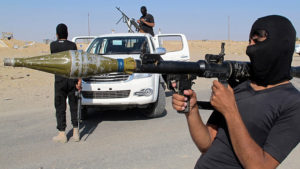Arms makers the big winners in Europe’s refugee crisis
Multinational companies providing Europe with security infrastructure to deal with the refugee influx are also among the biggest sellers of weapons to the areas of conflict which are producing the outflows of migrants, a new report claims.
According to the think tank the Transnational Institute arms companies such as Airbus, Finmeccanica, Thales and Safran, and technology giant Indra are benefitting from the crisis at both ends.
 They are the big players in Europe’s border security complex and they are also selling arms to third world nations.
They are the big players in Europe’s border security complex and they are also selling arms to third world nations.
“Airbus, Finmeccanica and Thales are among the top four European arms traders. All three firms actively sell arms to countries in West Asia and North Africa,” according to the report titled: ‘Border Wars: The Arms Dealers Profiting From Europe’s Refugee Tragedy’.
“Between 2005 and 2014, EU member states granted these firms and others arms exports licenses to West Asia and North Africa worth over 82 billion euros.
“Israeli firms have also benefitted from European efforts to fortifying its borders and have played a role in securing the Bulgarian and Hungarian borders,” the report says.
Since 2014, millions of people have made their way to Europe to seek asylum, primarily escaping wars and violence in the Middle East and North Africa. Asylum seekers have moved from countries wracked by civil war, militant and terrorist activities and economic decline.
The UN High Commissioner for Refugees’ recent Global Trends report says fighting in Syria, Afghanistan, Burundi and South Sudan have forced people to flee, mainly to Lebanon, Jordan and Turkey, and onwards to Europe, lifting refugee numbers at 21.3 million people last year.
The influx of refugees has led to disagreement and tension among member states on ways to tackle the crisis.
The report criticises what it says are questionable policies among some European nations to keep refugee numbers in check.
Denmark has legislated “the power to search clothes and luggage of asylum seekers… with a view to finding assets” to cover expenses such as food and accommodation.
Many countries are turning increasingly hostile toward taking in more refugees and far-right groups have demonstrated against the arrival of asylum seekers and are blaming this influx for an economic recession in the region.
“As a result, numerous refugees are held at the borders and detention camps and subjected to harsh treatment, with many others still choosing to cross over land and sea routes in hopes for a safer and better life,” the report says.
The report also details how arms companies have profited by “actively encouraging a growing securitisation of Europe’s borders and are willing to provide ever more draconian technologies to do this”.
The report says the EU’s increasingly militarised response to “fighting illegal immigration” has meant the border security market is now booming; it was estimated at some 15 billion euros in 2015 and is predicted to rise to over 29 billion euros annually in 2022.
Arms sales to the Middle East and North Africa, from where most refugees are fleeing, is also on the rise; between 2006-10 and 2011-15 global arms sales to the Middle East increased by 61 per cent, the report says.
Besides naming and exposing the companies profiting from the refugee crisis, the report also details the role the arms and security industry plays in shaping European border security policy through lobbying.
It says the arms and security industry has also captured much of the 316 million euros in funding provided by the EU for research on security issues.
“To really address the refugee crisis, we need to stop fuelling the conflicts in the first place and invest money spent on arms firms into providing a safe passage and a fair treatment of refugees,” said Transnational Institute spokesman Nick Buxton.
Airbus, Finmeccanica and Thales did not respond to emailed requests for comment.
Laurie Nowell
AMES Australia Senior Journalist












